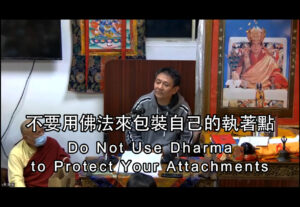 Do Not Use Dharma to Protect Your Attachments
Do Not Use Dharma to Protect Your Attachments
Our tendency to easily get nervous about anything is because we have points of attachments in our hearts.
If the point of attachment is strong, it manifests as a bad temper.
To protect these attachments, we start with getting angry or throwing tantrums, and then all sorts of tricks and schemes you can imagine are on the table.
Practicing Dharma is about breaking these points of attachments, not using Dharma to maintain them.
Many people practice Dharma by using Dharma to give their inner attachments a good wrapping, to prove that these attachments are correct. This then leads to very big problems.
Everyone has their points of attachment, which are your bottom lines.
In practice, as long as these points of attachments are not eliminated, your heart will never be at peace; if you have no bottom line, only then have you truly practiced well.
Everyone knows about the details of Dharma practice in their minds and everyone has the answers. Asking the master about them is just redundant.
The problem is actually that your heart is not in it to do it. This then creates great conflicts for you.
Of course, all religions, all faiths, all gods and Buddhas do work if you believe in them. However, this can only work once or twice for you, not for a lifetime!
The only exception is changing yourself. Changing yourself is the most effective way.
No one else can change your fate; only you can change yourself. The study of Dharma is about changing yourself!
Find out your points of attachment, and let them go.
We are humans after all! It is almost impossible to have no attachments or bottom lines, but at least don’t take them so seriously! If you can take things not too seriously, it means you have practiced well.
In terms of Dharma practice, if you cannot even tolerate a little bit of verbal insult, it means your practice is very poor.
Even if you have practiced for fifty years, a hundred years, or even if you had been a practitioner in a thousand years’ worth of past lives, you are still dropping the ball and disgracing yourself in this life.
Why is that? “Having self-attachment but being a good practitioner,” is not an idea recognized by Buddhism.
We often blame others for their sharp tongues, but in reality, we can’t blame anyone but ourselves for not practicing well and dropping the ball.
You can’t eliminate all those with sharp tongues - no, you can’t get all of them. Instead, it’s better if you just don’t be so mean with your own mouth, and don’t be so fragile in your heart.
Actually, being too fragile in the heart and caring too much about what others say, mean that you have practiced poorly. Having poor practice comes down to your own fault.
“I’m just that fragile inside, that’s how I am.”
Well, then there’s nothing you can do about it, just continue being fragile! This just brings you misery, don’t you think?
Even if you can fly in the sky, burrow through the earth, or predict the future, these are still not particularly great things, nor are they considered super powers.
If you can have no temper, be emotionally calm, and be fine with anything, that is the greatest superpower.
Have you practiced well or not? You know this best yourself.
If you have always been unable to move on about certain things, it’s actually because you’re not letting yourself go. Well, there’s no helping that.
We should all relax and not get so anxious about everything we see.
Shakyamuni Buddha spoke of the “sufferings of samsara,” but in the end, he also said that “the sufferings of samsara are just theatre.”
It means that there’s no such thing as true or false! No one is definitely good or definitely bad.
Just keep an ordinary mind. Let your mind be a little plainer.
Some people seem like they worry for others all day long, but in reality, they’re not worrying for others. They pretend it’s for others because they can’t get what they want; it’s all bullshit.
Excerpt from the teachings of HH Palyul Choktrul Rinpoche, Supreme Head of Nyingma, on “Pith Instructions Like Agar-35.” (1)
2023/01/11
Chinese 不要用佛法來包裝自己的執著點 Facebook link
